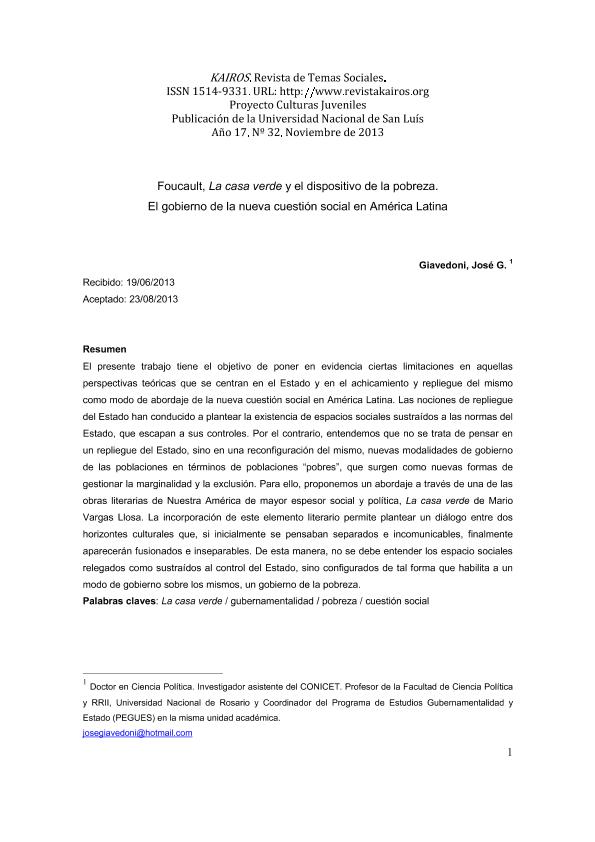Mostrar el registro sencillo del ítem
dc.contributor.author
Giavedoni, Jose Gabriel

dc.date.available
2017-04-20T19:40:57Z
dc.date.issued
2013-11
dc.identifier.citation
Giavedoni, Jose Gabriel; Foucault, La casa verde y el dispositivo de la pobreza: el gobierno de la nueva cuestión social en América Latina ; Universidad Nacional de San Luis; Kairos; 17; 32; 11-2013; 1-17
dc.identifier.issn
1514-9331
dc.identifier.uri
http://hdl.handle.net/11336/15518
dc.description.abstract
El presente trabajo tiene el objetivo de poner en evidencia ciertas limitaciones en aquellas perspectivas teóricas que se centran en el Estado y en el achicamiento y repliegue del mismo como modo de abordaje de la nueva cuestión social en América Latina. Las nociones de repliegue del Estado han conducido a plantear la existencia de espacios sociales sustraídos a las normas del Estado, que escapan a sus controles. Por el contrario, entendemos que no se trata de pensar en un repliegue del Estado, sino en una reconfiguración del mismo, nuevas modalidades de gobierno de las poblaciones en términos de poblaciones “pobres”, que surgen como nuevas formas de gestionar la marginalidad y la exclusión. Para ello, proponemos un abordaje a través de una de las obras literarias de Nuestra América de mayor espesor social y política, La casa verde de Mario Vargas Llosa. La incorporación de este elemento literario permite plantear un diálogo entre dos horizontes culturales que, si inicialmente se pensaban separados e incomunicables, finalmente aparecerán fusionados e inseparables. De esta manera, no se debe entender los espacio sociales relegados como sustraídos al control del Estado, sino configurados de tal forma que habilita a un modo de gobierno sobre los mismos, un gobierno de la pobreza.
dc.description.abstract
The aim of the present paper is to highlight certain limitations in those theoretical perspectives that focus on the State and redeployment of the same as way of working the new social question in Latin America. The notions of retreat of the State have led to consider the existence of social spaces subtracted to the rules of the State, which are beyond their control. On the contrary, we understand that this is not to think about a retreat of the State, but in a reconfiguration of the same, new forms of governance of the populations in terms of populations “poor”, that arise as new ways to manage the marginality and exclusion. For this reason, we propose an approach through one of the literary works of Our America of greater thickness and social policy, The Green House of Mario Vargas Llosa. The incorporation of this literary element allows you to raise a dialog between two cultural horizons that, if you initially thought separate and unconnected finally appear merged and inseparable. In this way, you should not understand the social space relegated as subtracted from the control of the State, but configured in such a way that enables a mode of government on the same, a government of poverty.
dc.format
application/pdf
dc.language.iso
spa
dc.publisher
Universidad Nacional de San Luis
dc.rights
info:eu-repo/semantics/openAccess
dc.rights.uri
https://creativecommons.org/licenses/by-nc-sa/2.5/ar/
dc.subject
La Casa Verde
dc.subject
Gubernamentalidad
dc.subject
Pobreza
dc.subject
Cuestión Social
dc.subject.classification
Otras Ciencia Política

dc.subject.classification
Ciencia Política

dc.subject.classification
CIENCIAS SOCIALES

dc.title
Foucault, La casa verde y el dispositivo de la pobreza: el gobierno de la nueva cuestión social en América Latina
dc.title
Foucault, The Green House and the dispositif of poverty: the government of the
new social question in Latin American
dc.type
info:eu-repo/semantics/article
dc.type
info:ar-repo/semantics/artículo
dc.type
info:eu-repo/semantics/publishedVersion
dc.date.updated
2017-04-19T18:22:44Z
dc.journal.volume
17
dc.journal.number
32
dc.journal.pagination
1-17
dc.journal.pais
Argentina

dc.journal.ciudad
Villa Mercedes
dc.description.fil
Fil: Giavedoni, Jose Gabriel. Universidad Nacional de Rosario. Facultad de Ciencia Política y Relaciones Internacionales; Argentina. Consejo Nacional de Investigaciónes Científicas y Técnicas; Argentina
dc.journal.title
Kairos
dc.relation.alternativeid
info:eu-repo/semantics/altIdentifier/url/http://www.revistakairos.org/foucault-la-casa-verde-y-el-dispositivo-de-la-pobreza-el-gobierno-de-la-nueva-cuestion-social-en-america-latina/
dc.relation.alternativeid
info:eu-repo/semantics/altIdentifier/url/https://dialnet.unirioja.es/servlet/articulo?codigo=4684587
Archivos asociados
